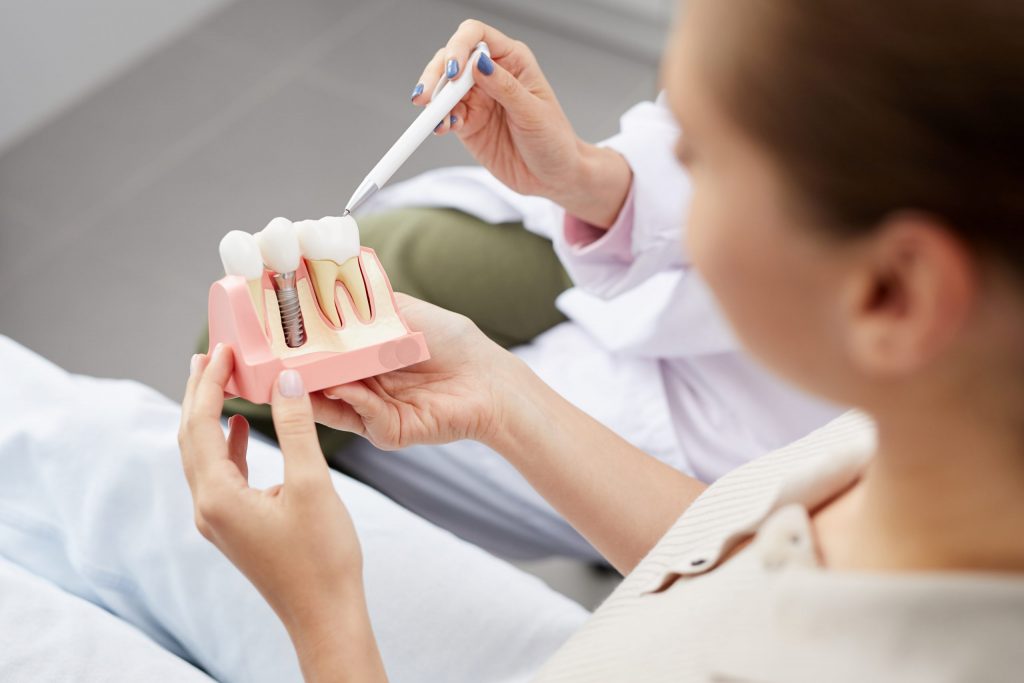
Are Dental Implants Safe?

Crafting hypo-allergenic dental implants has been a regular, safe, and consistent part of dentists’ work since 1965. Yet many prospective patients know very little about dental implants. This lack of knowledge can lead to worries about the safety of implants and the implantation process.
The quick answer to the question “Are dental implants safe?” is, Yes, they are safe. If you are curious about dental implants and their safety, here’s what you need to know.
Materials
Dental implants have an almost 100 percent success rate. One of the key reasons for this is that they are made of titanium.
Titanium is uniquely biocompatible. This means that it is welcomed by and cooperative with your body. Unlike other metals which can corrode, cause inflammation, or degrade over time, titanium:
- Is durable
- Does not cause irritation to your jaw or gums
- Is accepted by your body’s bones as if it were a naturally occurring substance
Titanium implants require no special care to maintain. As long as you stick to a standard dental hygiene plan, your implants will remain safe and reliable for many years.
Similarly, the dental-grade porcelain and other materials that we use to make crowns for permanent dental implants are durable, non-toxic, and body-friendly. They, too, require only the usual brushing and routine dental visits to maintain their quality, appearance, and functionality long-term.
Implantation Process
Our dental implantation process is designed to protect your safety and provide you with maximum convenience and comfort from start to finish.
The process begins with a complete dental exam conducted by a capable and experienced periodontist on our team. He or she will perform x-rays and take 3D images of your mouth and teeth. They will also discuss your medical history with you.
This in-depth look at your health and teeth enables us to:
- Develop a customized treatment plan best suited to your personal needs
- Identify any risk factors that may make dental implants inappropriate for you at that time
- Identify and put in place extra protections where necessary to accommodate any pre-existing conditions you may have
For example, some patients with qualifying heart conditions need a course of antibiotics prior to having dental implantation surgery to minimize the likelihood of infections. Our thorough preparatory process means that we are able to recognize needs like that and ensure you receive the best possible care at every step of the way.
Anesthesia
In most cases, dental implant patients only need a local anesthetic to numb the portion of their jaw where the implant is being installed. Administering a local anesthetic is a very low-risk procedure.
Patients who request sedation or more extensive anesthesia are monitored by our trained and experienced team throughout the procedure for safety.
Minimally Invasive
Getting dental implants is a quick and minimally invasive procedure. Single implants can be installed in less than an hour during outpatient surgery. Only the gums and jawbone immediately linked to the tooth being replaced are affected. Patients then have extensive time to fully heal before any additional work is done.
This keeps total stress on your body as low as possible.
Long-Term Durability
Properly cared for, dental implants last for decades. They will not break, corrode, shift, or otherwise cause discomfort or damage to your mouth.
Unlike dentures and other removable prosthetics, they also will not irritate your gums, jaw, or other teeth. This means that they do not create opportunities for injury, infection, or the introduction of foreign matter into your gums or bloodstream.


